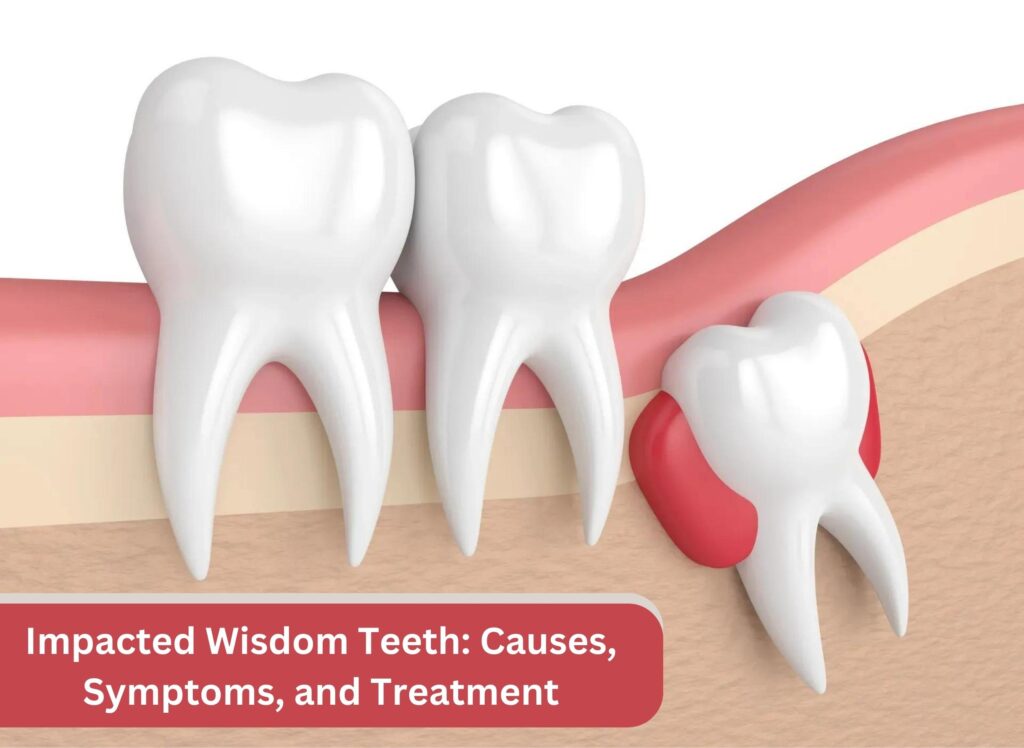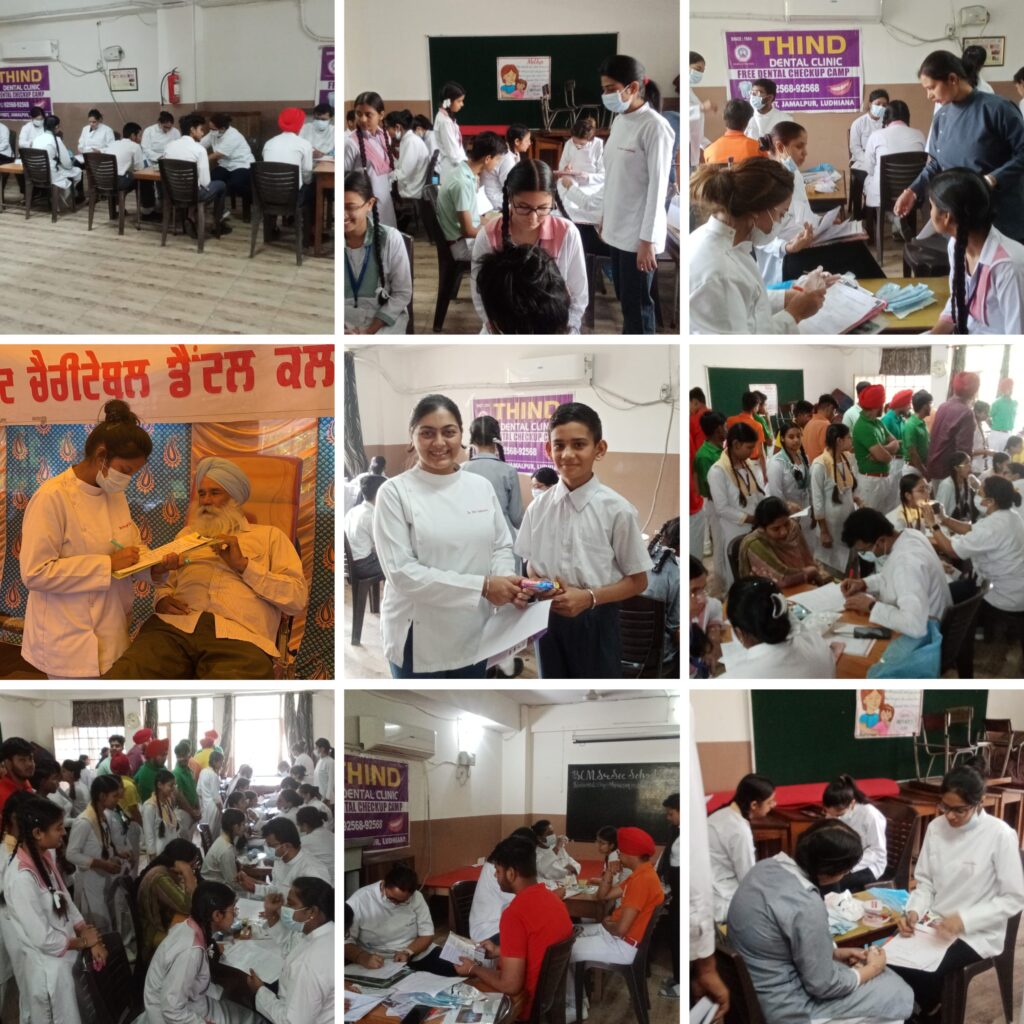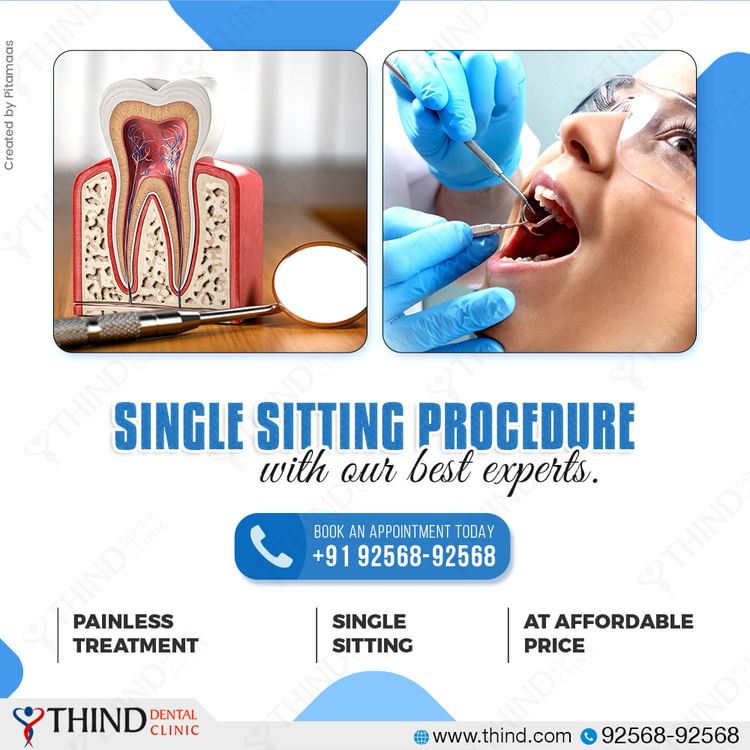Wisdom teeth, also known as third molars, are the final pair of molars in your mouth. These teeth typically emerge in your late teens or early twenties, and their arrival can bring a host of dental concerns, especially when they become impacted. In this comprehensive guide, we’ll delve into the causes, symptoms, and treatment options for impacted wisdom teeth, shedding light on this common dental issue. At Thind Dental Clinic in Ludhiana, we’re dedicated to providing you with valuable insights to maintain your oral health.
Understanding Impacted Wisdom Teeth
Causes of Impaction
Impaction occurs when there isn’t enough space in the jaw for the wisdom teeth to emerge properly. This can happen for various reasons:
Causes of Impaction
Impaction occurs when there isn’t enough space in the jaw for the wisdom teeth to emerge properly. This can happen for various reasons:
1. Lack of Space: A prevalent cause of wisdom tooth impaction is limited space within the jaw. If your jaw doesn’t have adequate room to accommodate these additional molars, they may become impacted. This lack of space can occur due to the modern evolution of smaller jaws in humans, which often struggle to accommodate these third molars comfortably.
2. Misalignment: Wisdom teeth can also become impacted when they grow in at an angle or direction that prevents them from erupting correctly. This misalignment can occur because the teeth are trying to emerge into a space already occupied by other teeth. As a result, they may grow sideways, slanted, or even backward, causing impaction.
3. Late Development: Wisdom teeth, also known as third molars, typically develop later than other teeth, often during late adolescence or early adulthood. In some individuals, this delayed development can lead to impaction because the jaw is already occupied by existing teeth. When wisdom teeth finally attempt to emerge, they may encounter obstructions, hindering their proper eruption.
4. Obstructions: Sometimes, impaction can occur due to physical obstructions in the path of the wisdom teeth. These obstructions can include bone, dense soft tissue, or adjacent teeth that prevent the molars from erupting normally.
5. Dental Crowding: Pre-existing dental crowding can also contribute to impaction. When your existing teeth are closely spaced or misaligned, it leaves limited space for additional teeth like wisdom molars to emerge correctly.
6. Genetics: Genetic factors can play a role in wisdom tooth impaction. Some individuals inherit smaller jaws or a genetic predisposition for late wisdom tooth development, increasing the likelihood of impaction.
Signs and Symptoms
Impacted wisdom teeth don’t always cause immediate pain or discomfort. However, there are several signs and symptoms to watch for:
1. Pain and Discomfort: Persistent pain or tenderness at the back of your mouth, often radiating to the ear, is a common symptom.
2. Swelling: Swelling of the gums in the back of your mouth can indicate impaction.
3. Difficulty Opening Your Mouth: Limited jaw movement, or difficulty opening your mouth fully, may occur.
4. Bad Breath: Infections around impacted wisdom teeth can lead to bad breath.
5. Taste Alterations: Unpleasant tastes or odors can develop due to the accumulation of debris around impacted teeth.
6. Headaches: Some individuals experience headaches as a result of the tension and pressure caused by impacted wisdom teeth.
Diagnosis and Assessment
If you experience any of these symptoms, it’s crucial to consult a dental professional. At Thind Dental Clinic in Ludhiana, our team of experts can perform a thorough examination, which may include X-rays to assess the position and condition of your wisdom teeth.
Treatment Options
Monitoring: In some cases, your dentist may recommend monitoring your wisdom teeth if they are not causing any immediate issues. Regular check-ups will ensure any problems are addressed promptly.
Medication: To manage pain and inflammation, your dentist may prescribe medication. However, this is frequently a short-term remedy.
Extraction is the most common therapy for impacted wisdom teeth. Here’s what the process involves:
1. Local Anesthesia: Your dentist will administer local anesthesia to numb the area around the tooth.
2. Tooth Removal: The dentist will carefully remove the impacted tooth. In some situations, the tooth may need to be sectioned into smaller pieces for simpler extraction.
3. Sutures: After extraction, sutures may be placed to aid in the healing process.
4. Recovery: You will be given instructions for post-operative care, including managing swelling, pain, and diet restrictions.
Surgical Extraction: In more complex cases, such as when the tooth is deeply impacted, surgical extraction may be necessary. This procedure is often performed by an oral surgeon.
Complications of Untreated Impacted Wisdom Teeth
Ignoring impacted wisdom teeth might result in a variety of complications:
1. Infections: Bacteria can accumulate around the impacted tooth, leading to infections such as pericoronitis.
2. Cysts and Tumors: Rarely, fluid-filled cysts or tumors can form around impacted teeth, causing further issues.
3. Dental Crowding: Impacted wisdom teeth can exert pressure on neighboring teeth, leading to misalignment and crowding.
4. Pain and Discomfort: Over time, untreated impacted wisdom teeth can cause chronic pain and discomfort.
Conclusion
Impacted wisdom teeth are a common dental concern, but with prompt diagnosis and treatment, you can avoid potential complications and discomfort. At Thind Dental Clinic in Ludhiana, we’re here to provide you with the expert care you need to address impacted wisdom teeth and maintain your oral health. Don’t hesitate to reach out to our experienced team for a comprehensive evaluation and personalized treatment plan. Our major priorities are your comfort and well-being.
For additional information or to arrange an appointment with us
You can contact us at +91-92568-92568
or visit us at:
THIND DENTAL CLINIC
11-12-13-14 H.I.G Market, Opposite Water Tank, Ludhiana, Punjab 141010.
Also Read:
Single Sitting Procedure: Painless and Affordable Dental Care at Thind Dental Clinic
Dental Care for Children: Expert Tips for Parents on Caring for Your Child’s Teeth
The Importance and Benefits of Regular Dental Checkups: Ensuring Optimal Oral Health
Professional Dental Implants: Restoring Smiles with Precision and Care at Thind Dental Clinic in Ludhiana

 Timings
Timings


